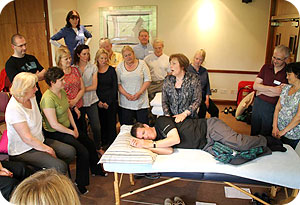Flexible Healing describes the way we work in our practice, each person that comes through our treatment room is seen as a unique person.  Each treatment is created just for them and often can and does change with their needs. It takes a great belief in yourself as a therapist to be flexible and also have a broad and deep understanding of your anatomy and physiology including sensitive communication skills that are clear, creative and empathic.
Each treatment is created just for them and often can and does change with their needs. It takes a great belief in yourself as a therapist to be flexible and also have a broad and deep understanding of your anatomy and physiology including sensitive communication skills that are clear, creative and empathic.
At the workshop, all of the above are reflective.
Communication is an ongoing development for myself also.
Our practice is made up of a number of people in long term chronic pain; the workshops thus reflect that knowledge gained.
When treating long term chronic pain sufferers, as David Butler and Lorimer Moseley suggest that pacing through the day and resting at times is really great to minimize pain that can be tiring.
What I have noticed is that often patients find it hard to accept ‘rest’ or even ‘taking it easy’. They may see it as ‘giving in’, ‘being weak’ or because ‘you don’t understand how busy my life is’ – All of this is correct because it is ‘their’ experience of ‘their’ world and life.
It is up to us to find a language that becomes meaningful for them. For example, if the word ‘rest’ or ‘resting’ doesn’t work for them then I try ‘how about pushing the pause button?’, you are not saying ‘no’ or ‘yes’ to anything, simply ‘I just need to take a moment’ throughout the day or even on a day out. It has been a surprise just how many people, women and men alike, can place some meaning and attachment to ‘taking a pause’!
We often rehearse when to take a moments ‘rest’ pause; when would this feel easy; doing it before they become too tired or it becomes too painful; investigating what would stop them? All really useful in encouraging these people to take charge of their condition and themselves.
Sometimes when patients can’t do this, I ask them if ‘Rest’ had a colour, what it would be. In my experience a colour is often attached to a moment when they felt at peace. Help them to build on that memory, encourage them to recall that moment when they need to ‘pause’ or ‘rest’ but also having some fun with it.
Smiles and laughter to a long way in enabling people to overcome something they find tough.
Just my thoughts, I hope you find them helpful.
